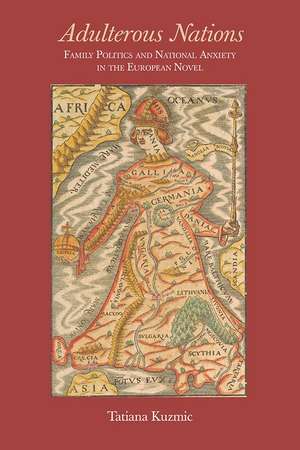Adulterous Nations: Family Politics and National Anxiety in the European Novel
Autor Tatiana Kuzmicen Limba Engleză Paperback – 15 noi 2016
In Adulterous Nations, Tatiana Kuzmic enlarges our perspective on the nineteenth-century novel of adultery, showing how it often served as a metaphor for relationships between the imperialistic and the colonized. In the context of the long-standing practice of gendering nations as female, the novels under discussion here—George Eliot’s Middlemarch, Theodor Fontane’s Effi Briest, and Leo Tolstoy’s Anna Karenina, along with August Šenoa’s The Goldsmith’s Gold and Henryk Sienkiewicz’s Quo Vadis—can be understood as depicting international crises on the scale of the nuclear family. In each example, an outsider figure is responsible for the disruption experienced by the family. Kuzmic deftly argues that the hopes, anxieties, and interests of European nations during this period can be discerned in the destabilizing force of adultery. Reading the work of Šenoa and Sienkiewicz, from Croatia and Poland, respectively, Kuzmic illuminates the relationship between the literature of dominant nations and that of the semicolonized territories that posed a threat to them. Ultimately, Kuzmic’s study enhances our understanding of not only these five novels but nineteenth-century European literature more generally.
Preț: 266.37 lei
Preț vechi: 305.17 lei
-13% Nou
Puncte Express: 400
Preț estimativ în valută:
50.97€ • 55.54$ • 42.95£
50.97€ • 55.54$ • 42.95£
Carte indisponibilă temporar
Doresc să fiu notificat când acest titlu va fi disponibil:
Se trimite...
Preluare comenzi: 021 569.72.76
Specificații
ISBN-13: 9780810133976
ISBN-10: 0810133970
Pagini: 248
Ilustrații: 2 b-w images
Dimensiuni: 152 x 229 x 23 mm
Greutate: 0.34 kg
Editura: Northwestern University Press
Colecția Northwestern University Press
ISBN-10: 0810133970
Pagini: 248
Ilustrații: 2 b-w images
Dimensiuni: 152 x 229 x 23 mm
Greutate: 0.34 kg
Editura: Northwestern University Press
Colecția Northwestern University Press
Notă biografică
TATIANA KUZMIC is an assistant professor of Slavic and Eurasian studies at the University of Texas.
Cuprins
Table of contents
Acknowledgments
Note on Translation, Transliteration, and Dates
Introduction
PART I: EMPIRES
Chapter 1
Middlemarch: The English Heroine and the Polish Rebel(lions)
Chapter 2
Effi Briest: German Realism and the Young Empire
Chapter 3
Anna Karenina: The Slavonic Question and the Dismembered Adulteress
PART II: NATIONS
Chapter 4
The Goldsmith’s Gold: The Origins of Yugoslavism and the Birth of the Croatian Novel
Chapter 5
Quo Vadis: Polish Messianism and the Proselytizing Heroine
Conclusion
Notes
Bibliography
Acknowledgments
Note on Translation, Transliteration, and Dates
Introduction
PART I: EMPIRES
Chapter 1
Middlemarch: The English Heroine and the Polish Rebel(lions)
Chapter 2
Effi Briest: German Realism and the Young Empire
Chapter 3
Anna Karenina: The Slavonic Question and the Dismembered Adulteress
PART II: NATIONS
Chapter 4
The Goldsmith’s Gold: The Origins of Yugoslavism and the Birth of the Croatian Novel
Chapter 5
Quo Vadis: Polish Messianism and the Proselytizing Heroine
Conclusion
Notes
Bibliography
Recenzii
"Adulterous Nations is a significant accomplishment with special resonance in comparative literature and Slavic literature. It offers a creative and imaginative reworking of a set of novels vis-à-vis European space and geopolitics. Well written, carefully and logically structured, and thoroughly researched, this book demonstrates the author’s considerable linguistic and cultural expertise across several national literatures." —Jessie Labov, author of Transatlantic Central Europe: Contesting Geography and Redefining Culture beyond the Nation
"Adulterous Nations brings together two “hot” topics in literary criticism—sex and geopolitics—and argues for their interconnectedness in the nineteenth-century novel. Drawing on Kuzmic’s enviable linguistic capabilities and a wealth of historical research, the book explores this theme in five novels: three novels of empire (English, German, and Russian) and two from stateless “colonized” nations (Poland and Croatia). Although the stated topic is adultery, ultimately the book engages more profoundly with questions of belonging and outsiderhood and the complex, shifting perception of Slavic nations by their neighbors throughout the second half of the nineteenth century. The book is at its best in its detailed historical research and intriguing insights into the way geopolitics infuses the amorous themes. It is a model of historically grounded comparative study: it traces a theme across multiple national traditions, making a place for often overlooked minorities and reinstating them in the broader European tradition." —Comparative Literature
"Adulterous Nations brings together two “hot” topics in literary criticism—sex and geopolitics—and argues for their interconnectedness in the nineteenth-century novel. Drawing on Kuzmic’s enviable linguistic capabilities and a wealth of historical research, the book explores this theme in five novels: three novels of empire (English, German, and Russian) and two from stateless “colonized” nations (Poland and Croatia). Although the stated topic is adultery, ultimately the book engages more profoundly with questions of belonging and outsiderhood and the complex, shifting perception of Slavic nations by their neighbors throughout the second half of the nineteenth century. The book is at its best in its detailed historical research and intriguing insights into the way geopolitics infuses the amorous themes. It is a model of historically grounded comparative study: it traces a theme across multiple national traditions, making a place for often overlooked minorities and reinstating them in the broader European tradition." —Comparative Literature
"Specialists in comparative literature or in any of the five national literatures treated—British, German, Russian, Croatian or Polish—will find the book valuable, and any curious lover of literature will be broadened and enlightened by reading Tatiana Kuzmic’s Adulterous Nations." —Slavic Review
"This stimulating cross-cultural study of how narratives of marital discord converge with issues of nation and empire in European "realism" between 1870 and 1900 straddles a divide in literary studies... The author is to be praised for bringing works from the so-called "minor" literatures of Croatia and Poland into a complex, historically meaningful relationship with Fontane’s, and especially Eliot’s and Tolstoy’s well-known novels." —Russian Review
Descriere
In Adulterous Nations, Tatiana Kuzmic enlarges our perspective on the nineteenth-century novel of adultery, showing how it often served as a metaphor for relationships between the imperialistic and the colonized.
